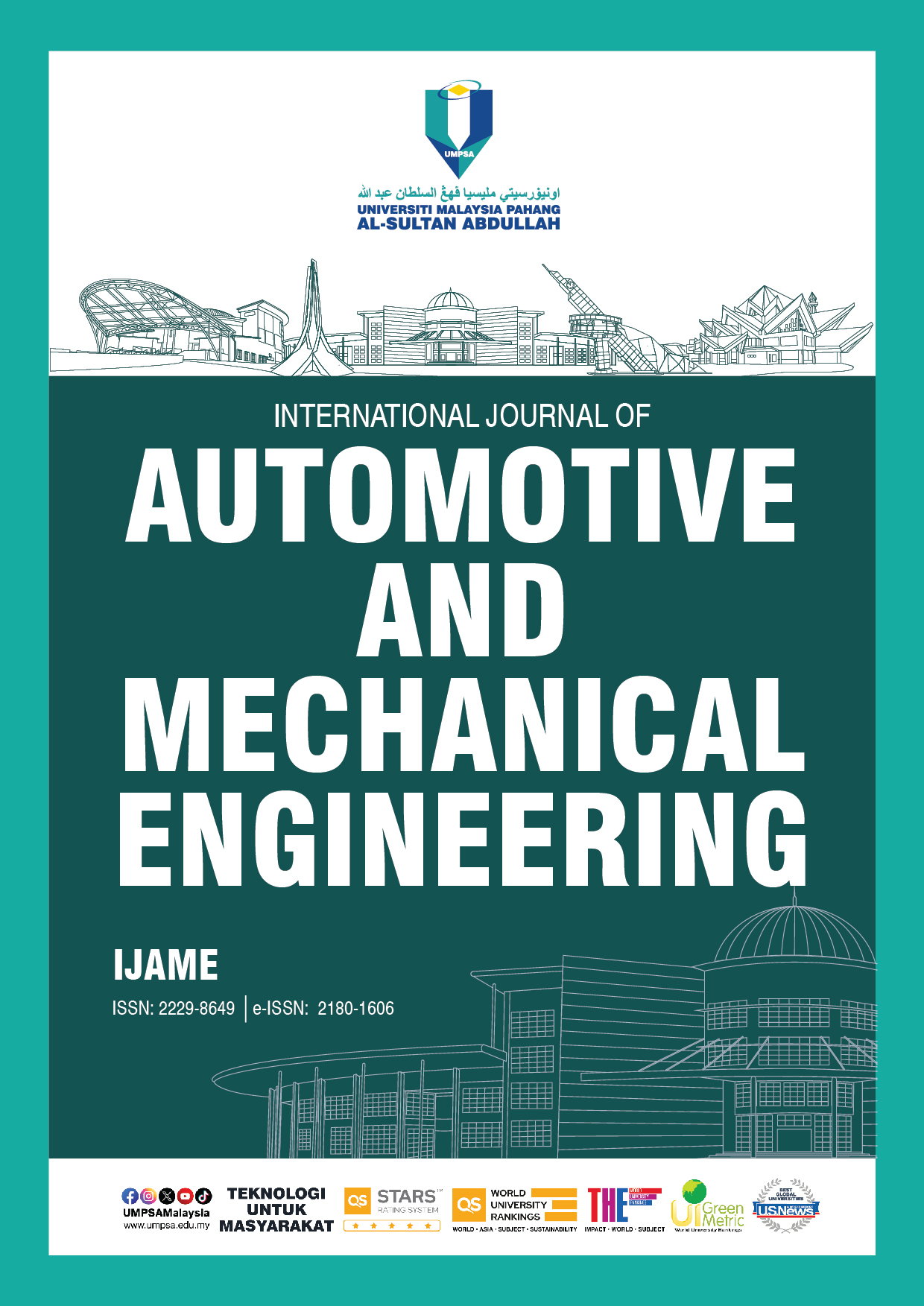Wheel Slip Equilibrium Point Model Reference Adaptive Control Based PID Controller for Antilock Braking System: A New Approach
DOI:
https://doi.org/10.15282/ijame.21.3.2024.10.0893Keywords:
Antilock braking system, Controller, MRAC, PID, Wheel Slip equilibrium pointAbstract
This paper presents a new approach to wheel slip control in Antilock Braking System (ABS) using an Approximated First Order Wheel Slip (AFOWS) Model Reference Adaptive Control (MRAC) based PID (AFOWS-MRAC-PID) controller. An ABS was modeled in a MATLAB/Simulink environment using a quarter car model with the proposed controller. Simulations were conducted with a wide range of adaptation gains (50, 100, 150, 200, and 250) to study the effectiveness of the proposed control system. The results revealed that the proposed system could track and maintain 10% wheel slip and eliminate oscillation (instability) in terms of overshoot associated with conventional PID controllers, particularly on wet and snowy road surfaces, using adaptation gains of 150, 200, and 250. Overall, the proposed system provided the best performance in terms of stopping distance, vehicle braking velocity, and braking torque on all road surfaces with an adaptation gain of 250, although braking on dry road surfaces was the most effective.
References
P.C. Eze, F.A. Aigbodioh, C. Muoghalu, and I.H. Ezeanya, "Linear slip control for improved antilock braking," International Research Journal of Advance Engineering and Science, vol. 3, no. 1, pp. 198-206, 2018.
G.F. Mauer, "A fuzzy logic controller for an ABS braking system, "IEEE Transactions on Fuzzy Systems, vol. 4, no. 4, pp. 381-388, 1995.
W.K. Lennon and K.M. Passino, "Intelligent control for brake systems," IEEE Transactions on Control Systems Technology, vol. 7 no. 2, pp. 188-202, 1999.
B.C. Agwah and P.C. Eze, "An intelligent controller augmented with variable zero lag compensation for antilock braking system," International Journal of Mechanical & Mechatronics Engineering, vol. 16, no. 11, pp. 303-310, 2022.
P.C. Eze, B.O. Ekengwu, N.C. Asiegbu, and T.I. Ozue, "Adjustable gain enhanced fuzzy logic controller for optimal wheel slip ratio tracking in hard braking control system," Advances in Electrical and Electronic Engineering, vol. 19, no. 3, pp. 231-242, 2021.
A.A.Aly, E.S. Zeidan, A. Hamed, and F. Salem, "An antilock-braking system (ABS) control: A technical review," Intelligent Control and Automation, vol. 2, pp. 186-195, 2011.
V.R. Aparow, F. Ahmad, K. Hudha and H. Jamaludin, "Modelling and PID control of antilock braking system with wheel slip reduction to improve braking performance," International Journal of Vehicle Safety, vol. 6, no. 3, pp. 265–296, 2013.
P.C. Eze and I.E. Achumba, "Investigation of slip minimization in vehicles under different drag coefficients," in 2017 IEEE 3rd International Conference on Electro-Technology for National Development, pp. 1–9, 2017.
S. John and J.O. Pedro, "Hybrid feedback linearization slip control for anti-lock braking system," Acta Polytechnica Hungarica, vol. 10, no. 1, pp. 81–99, 2013.
S.I. Haris, F. Ahmad, M.H. Che Hassan, A.K. Mat Yamin, and N.R. Mat Nuri, "Self tuning PID control of antilock braking system using electronic wedge brake," International Journal of Automotive and Mechanical Engineering, vol. 18, no. 4, pp. 9333-9348, 2021.
M. Singh, A. Rani , and V. Singh, "Wheel slip-based intelligent controller design for anti-lock braking system," Advanced Research in Electrical and Electronic Engineering, vol. 1, no. 3, pp. 82–88, 2014.
V. Vodovozov, E. Petlenkov, A. Aksjonov, and Z. Raud, "Fuzzy gradient control of electric vehicles at blended braking with volatile driving conditions," in Proceeding 17th International Conference on Informatics in Control, Automation and Robotics, pp. 250-261, 2020.
G. Li, T. Wang, R. Zhang, F.Gu, and J. Shen, "An improved optimal slip ratio prediction considering tyre inflation pressure changes," Journal of Control Science and Engineering, vol. 2015, no. 1, p. 512024, 2015.
A.B. Sharkawy, "Genetic fuzzy self-tuning PID controllers for antilock braking systems," Engineering Applications of Artificial Intelligence, vol. 23, pp. 1041–1052, 2010.
V. Ćirović and D. Aleksendrić, "Adaptive neutron-fuzzy wheel slip control," Expert Systems with Applications, vol. 40, pp. 5197–5209, 2013.
S.R. Gampa, K. Jasthi, S. Alapati, S.K. Gudey, and V.E. Balas, "Fuzzy genetic algorithm based antilock braking system," in Proceedings of the International Conference on Artificial Intelligence Techniques for Electrical Engineering Systems, pp. 13-22, 2023.
A. Aksjonov, K. Augsburg, and V. Vodovozov, "Design and simulation of robust ABS and ESP fuzzy logic controller on complex braking maneuvers," Applied Sciences, vol. 6, no. 12, p. 382, 2016.
A. Shahabi, A.H. Kazemian, S. Farahat, and Sarhaddi, "Wheel slip ratio regulation for investigating the vehicle's dynamic behavior during braking and steering input," Mechanics & Industry, vol. 22, p. 17, 2021.
X.-D. Zhang and C.-K. Chen, "A study of a cornering braking control system for a motorcycle," Applied Sciences, vol. 12, no. 24, p. 12575, 2022.
E. Kayacan, Y. Oniz, and O. Kaynak, "A grey system modeling approach for sliding mode control of antilock braking system," IEEE Transactions on Industrial Electronics, vol. 56, no. 8, pp. 3244–3252, 2009.
A. Marzbanrad, F. Bruzelius, B. Jacobson, and E. Drenth, "Enhanced sliding mode wheel slip controller for heavy goods vehicles," in Proceedings of the FISITA 2020 World Congres, Prague, 14-18 September 2020, pp. 1-6, 2020.
S. Latreche and S. Benaggoune, "Robust wheel slip for vehicle antilock braking system with fuzzy sliding mode controller (FSMC)," Engineering, Technology & Applied Science Research, vol. 10, no. 5, pp. 6368–6373, 2020.
J. Sun, X. Xue and K.W.E. Cheng, "Fuzzy sliding mode wheel slip ratio control for smart vehicle anti-lock braking system," Energies, vol. 12, no. 13, p. 2501, 2019.
S. Rajendran, S.K. Spurgeon, G. Tsampardoukas, and R. Hampson, "Estimation of road frictional force and wheel slip for effective braking system (ABS) control," International Journal of Robust and Nonlinear Control, vol. 29, pp. 736-765,
G.V. Dankan, M. Ramesha, S.B. Sridhara, P.G. Naveena, and K.P. Sachin, "Design of antilock braking system based on wheel slip estimation," Journal of Physics: Conference Series, vol. 1706, no. 1, p. 012216, 2020.
Y. He, C. Lu, J. Shen and C. Yuan, "Design and analysis of output feedback constraint control for antilock braking system with time-varying slip ratio," Mathematical Problems in Engineering, vol. 2019, no. 1, p. 8193134, 2019.
X. Chen, Z. Dai, H. Lin, Y. Qiu, and X. Liang, "Asymetric barrier Lyapunov function-based wheel slip control for antilock braking system," International Journal of Aerospace Engineering, vol. 1, p. 917807, 2015.
Y. Song, S. Wu, and Y. Yan, "Development of self-tuning PID controller based on 115 for indoor air quality control," International Journal of Emerging Technology and Advanced Engineering, vol. 3, no. 11, pp. 283-290, 2013.
H. Liu, Q. Yu, and Q. Wu, "PID control model based on back propagation neural network optimized by adversarial learning-based grey wolf optimization," Applied Sciences, vol.13, 4767, 2023.
J. Guo, X. Jian, and G. Lin, "Performance evaluation of an anti-lock braking system for electric vehicles with a fuzzy sliding mode controller," Energies, vol. 7, no. 4, pp. 6459–6476, 2014.
A. Alleyne, "Improved vehicle performance using combined suspension and braking forces," Vehicle System Dynamics, vol. 27, no. 4, pp. 235–265, 1997,
C. Jain, R. Abhishek, and D. Abhishek, "Linear control technique for anti-lock braking system," International Journal of Engineering Research and Applications, vol. 4, no. 8, pp. 104-108, 2014.
C. Canudas-de-Wit, P. Tsiotras, E. Velenis, M.Basset, and G. Gissinger, "Dynamic friction models for road/tire longitudinal interaction," Vehicle System Dynamics, vol. 39, pp. 189–226, 2003.
S. M. Savaresi and M. Tanelli, "Active braking control systems design for vehicles," 1st ed. London: Springer-Verlag London, 2010.
M. Watany, "Performance of a road vehicle with hydraulic brake systems using slip control strategy," American Journal of Vehicle Design, vol. 2, no. 1, pp. 7-18, 2014.
S. John, "Development of nonlinear real-time intelligent controllers for anti-lock braking systems (ABS)," PhD Thesis, University of the Witwatersrand, Johannesburg, 2012.
D. Yoo, "Model based wheel slip control via constrained optimal algorithm," Master's Thesis, RMIT University, Melbourne, Australia, 2006.
A.W. Ndiaye, J.-M. Biannic, M. Cassaro, C. Combier, and J.-B. Lestage, "Advanced aircraft braking control laws design and validation," in Proceeding 9th European Conference for Aeronautics and Space Sciences, pp. 1-16, 2021.
P.C. Eze, C.A. Ugoh, C.P. Ezeabasili, B.O. Ekengwu, and L.E. Aghoghovbia, "Servor position control in hard disk drive of a computer using MRAC integrating PID algorithm," American Journal of Science, Engineering and Technology, vol. 2, no. 4, pp. 97-105, 2017.
A. Daiifarshchi and S. Bargandan, "Design of a model reference adaptive controller using modified MIT rule for a second order system," Journal of Artificial Intelligence in Electrical Engineering, vol. 7, no. 25, pp. 7-14, 2018.
M. Micev, M. Ćalasan, Z.M. Ali, H.M. Hasanien, and S.H.E. Abdel Aleem, "Optimal design of automatic voltage regulation controller using hybrid simulated annealing - Manta ray foraging optimization algorithm," Ain Shams Engineering Journal, vol. 12, no. 1, pp. 641-657, 2021.
Zurich Instruments, "Principles of PID controllers," July 2023, https://www.zhinst.com/others/en/resources/principles-of-pid-controllers
I. Birs, I. Nascu, C. Ionescu, and C. Muresan, "Event-based fractional order control," Journal of Advanced Research, vol. 25, pp. 191-203, 2020.
S. Folea, R. De Keyser, I.R. Birs, C.I. Muresan, and C. Ionescu, "Discrete-time implementation and experimental validation of a fractional order PD controller for vibration suppression in airplane wings," Acta Polytechnica Hungarica, vol. 14, no. 1, pp. 191-206, 2017.
Downloads
Published
Issue
Section
License
Copyright (c) 2024 The Author(s)

This work is licensed under a Creative Commons Attribution-NonCommercial 4.0 International License.







